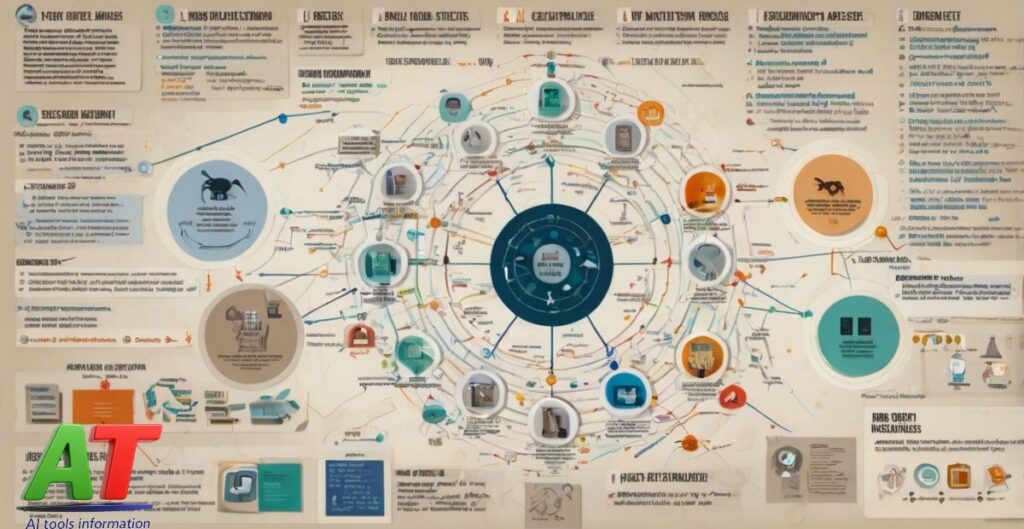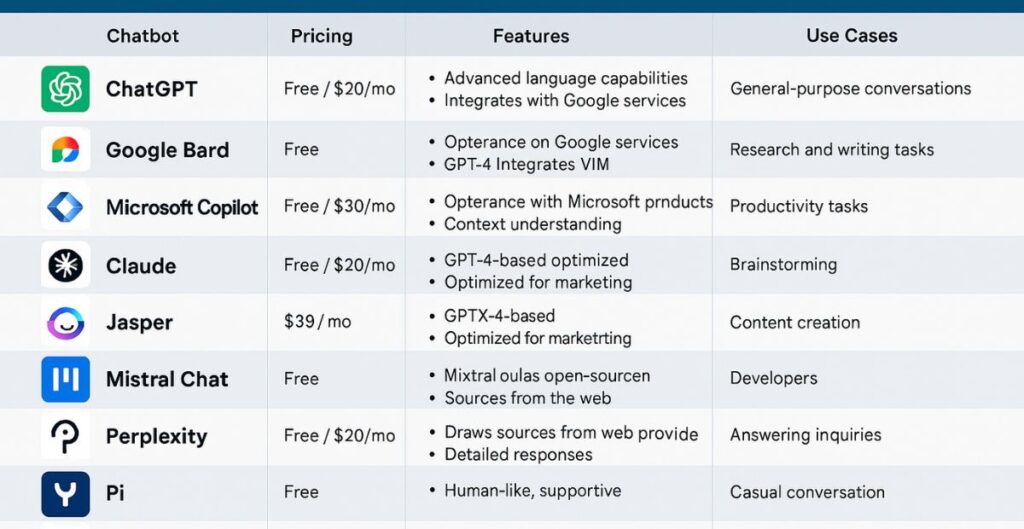Best AI Tools for Research: Your Guide to the Top Free and Paid AI Research Tools in 2025

Introduction
In today’s fast-paced academic world, best free AI tools for research have become essential for students, professionals, and academics alike. These powerful AI research assistant tools help simplify complex tasks like literature reviews, data analysis, and paper summarization.
With advancements in machine learning tools for research and natural language processing in research, even the most time-consuming projects become manageable. In 2025, many of these tools are available for free, making high-quality research support accessible to everyone. Whether you’re tackling a thesis or organizing your bibliography, these tools improve accuracy and save precious time. Exploring the best free AI tools for research can transform your workflow and boost your productivity.
What Are AI Tools for Research?
At their core, AI tools for research are software programs powered by artificial intelligence that help with research tasks. These tools use machine learning for academic work and natural language processing in research to understand text, analyze data, and generate content. They assist researchers by automating tedious parts of the process like searching through articles or summarizing long papers.
For example, AI research assistant tools can quickly find relevant studies or help organize your notes. These tools learn and adapt, offering more precise help over time. Their growing use in the USA shows how important AI in university-level research has become, making research faster and more accurate than ever before.
Categories of AI Research Tools
The world of AI research tools is broad. Some focus on academic writing tools powered by AI, helping you draft and edit papers. Others specialize in research automation using AI to scan databases and collect data efficiently. There are AI tools for literature review that sift through thousands of articles to find what matters most.
In addition, ai tools for citation generation and free tools for academic referencing save you hours formatting your bibliography. Meanwhile, qualitative data analysis tools and statistical analysis software support deeper insights. Together, these categories cover every step from idea to finished paper, offering support tailored to each research need.
Benefits of Using Research AI Tools

Using AI tools for research improves both speed and accuracy. They handle repetitive tasks so you can focus on thinking critically. This leads to better quality work in less time. For students, these tools level the playing field, offering professional support at no or low cost.
In the USA, academic content creation with AI has also made research more accessible across disciplines. AI helps maintain academic integrity by checking for plagiarism and suggesting proper citations. Ultimately, these tools reduce human error and open doors for more innovative, cross-disciplinary work using predictive analytics in research and cloud-based research tools.
Best AI Research Tools for Academics and Researchers
Academics often rely on platforms like AI academic search engines to find papers and datasets quickly. Tools such as Litmaps and Connected Papers provide visual citation mapping to see how studies connect. For writing, software like Grammarly and QuillBot offer AI-based editing tools for researchers, improving clarity and style.
Some advanced tools combine several features, acting as all-in-one AI-powered thesis writing tools or AI assistant for research paper writing. These streamline complex tasks from outlining to drafting and referencing, helping researchers meet tight deadlines while maintaining quality.
ChatGPT and Generative Artificial Intelligence: AI Tools for Research
Generative AI models like ChatGPT have revolutionized research assistance. They generate ideas, rephrase content using ai-based paraphrasing tools, and summarize complex texts instantly. This generative AI in higher education has become an essential part of the toolkit for many students and professors in 2025.
By providing instant feedback and suggestions, ChatGPT helps with academic writing tools powered by AI and improves overall productivity. However, it’s important to use it responsibly to avoid issues with originality and to ensure it complements rather than replaces critical thinking.
Top AI Tools for Research 2025

The AI research landscape changes rapidly, but some names remain top choices. Tools like Zotero and Mendeley lead in citation management platforms. Semantic Scholar and Google Scholar continue to be favorites among academic search platforms for finding reliable papers.
Newcomers like Elicit use AI to automate literature searches and generate outlines. These tools combine research workflow automation with user-friendly interfaces, making them ideal for students and professionals alike. The best tools in 2025 balance power with simplicity.
Best AI Tools for Literature Review
Literature reviews demand sifting through massive amounts of information. AI tools like Iris.ai and ResearchRabbit use AI tools for literature review to scan, organize, and prioritize relevant studies quickly. They help researchers spot trends and gaps in existing research with ease.
These tools often include summarization tools for scholars that condense lengthy articles into digestible summaries. This allows for efficient research paper organization with AI, so you spend less time searching and more time analyzing.
Free AI Tools for Research Literature Review

Many free AI tools offer powerful features for literature reviews. Platforms like Connected Papers and Litmaps provide free AI citation generators and visual citation mapping at no cost. These tools help users visualize relationships between papers without expensive subscriptions.
Students especially benefit from these free options, gaining access to professional-grade ai note-taking tools for students and research paper summarizer tools. Though some features may be limited, these resources remain vital for affordable, effective research in 2025.
Top Free AI Tools for Research Table
| Tool Name | Features | Cost | Best For | Integration |
| Zotero | Citation management, PDF organizer | Free | Students & Academics | Word, Google Docs |
| Connected Papers | Visual citation mapping, literature search | Free | Literature review | Web-based |
| Elicit | Automated literature search, summarization | Free | Early-stage researchers | Web-based |
| Grammarly | AI writing assistant, grammar checking | Free & Paid | Writing & Editing | Multiple platforms |
Best AI Tools for Research Paper Understanding
Understanding dense research papers is challenging. AI-powered research paper summarizer tools help by breaking down complex texts into simple summaries. Tools like Scholarcy and Sumnotes extract key points, methods, and conclusions.
These tools use natural language processing in research to highlight important sections and save time. For many, they make it easier to stay current in fast-moving fields without reading every paper in full.
Best Free AI Tools for Research Paper Summary

Some AI tools provide free AI academic writing assistants that generate summaries from long papers. Scholarcy, for example, offers a free tier that highlights key information and creates summary flashcards.
Such tools are perfect for students needing quick overviews or professionals balancing heavy reading loads. They bring ai for citation tracking and management and help you avoid missing critical insights.
Best Free AI Tools for Research Paper Writing (PDF Integration)
Writing research papers often requires annotating and referencing PDFs. AI tools like Paperpile and Mendeley offer PDF integration to annotate, organize, and link citations easily.
With these, researchers can draft papers smoothly while managing sources. This simplifies academic writing tools powered by AI and keeps your workflow uninterrupted.
Best AI Writing & Editing Tools
To improve writing quality, tools like Grammarly and ProWritingAid offer AI-based editing tools for researchers. They catch grammar mistakes, suggest style improvements, and ensure clarity.
These tools work across platforms, helping researchers refine their manuscripts, theses, or grant proposals. Using them reduces time spent revising while boosting professionalism.
Free AI Tools for Research – For Students

Students benefit greatly from free AI tools tailored to academic needs. Apps like Ref-N-Write and QuillBot provide ai-powered writing assistant for academics focused on paraphrasing and grammar checks.
These tools help students manage deadlines and improve writing skills while ensuring their work stays original. They’re especially useful in the USA where academic standards are high.
Free AI Tools for Citation and Referencing
Correct citations matter. Tools like Zotero, CiteThisForMe, and BibMe are free tools for academic referencing that automate citation formatting in APA, MLA, Chicago, and more.
They reduce errors and save hours of manual work, making them essentials for anyone writing research papers.
Comparison of AI Tools for Research

Choosing the right AI tool depends on your needs. Some prioritize research workflow automation, while others focus on writing support or data analysis. For instance, Zotero excels in citation management but lacks deep content summarization.
On the other hand, Elicit offers strong literature search capabilities but less writing assistance. Cost is another factor—free tools provide basics, but paid options unlock advanced features. Knowing what matters most to you will help select the perfect match.
Important Things to Know Before Getting Started
Before relying on AI tools, consider limitations. AI can make mistakes or miss nuances, so always review its output. Data privacy is also crucial; ensure your tools comply with regulations like FERPA or GDPR if you handle sensitive info.
Remember, AI aids but doesn’t replace your judgment. Understanding how these tools work ensures you use them safely and effectively.
Can AI Replace Human Researchers?
Despite advances, AI cannot fully replace human researchers. Creativity, critical thinking, and ethical decisions require a human touch. AI acts as a research assistant tool, amplifying your abilities rather than substituting them.
Many experts agree AI will keep transforming research workflows but always alongside human intelligence. As one scholar said, “AI is a partner, not a competitor, in advancing knowledge.”
Further Reference and Learning Resources

To dive deeper, explore courses on AI in research, such as those offered by Coursera or edX. Journals like Nature and Science publish studies on AI applications in scholarly research. Online communities also share tips on the latest machine learning tools for research.
These resources help keep your skills sharp and informed about emerging tools and trends.
Conclusion
The rise of AI tools for research is reshaping how students, academics, and professionals work in the USA. These tools help with everything from academic writing improvement to research paper summarization and citation management platforms. Whether you need free AI tools for understanding research papers or premium software, the key is to find tools that fit your workflow and enhance your productivity.
By embracing AI responsibly, you can unlock new levels of research efficiency and insight. The future of academic research will be defined by this synergy between human intelligence and AI innovation.
FAQS
| FAQ | Answer |
| Which free AI is best for research? | Elicit is one of the best free AI tools for research, offering literature search and summarization features. |
| What is the best AI tool for research paper writing free? | Grammarly and QuillBot are top free AI tools that assist with writing and editing research papers. |
| What is the best AI tool for researchers? | Zotero and Semantic Scholar are widely used AI tools favored by researchers for citation and search. |
| Which is the best AI tool for free? | Zotero stands out as the best free AI tool for citation management and research organization. |
| AI Research tool | AI research tools automate tasks like data analysis, literature review, and citation to improve research efficiency. |
Meta Description
Discover the best free AI tools for research in 2025 to speed up literature reviews, writing, and data analysis efficiently.
Must Read
If you want to get more information about the Free ai tools in 2025 follow the below button
Click Here
And if you want to get more knowledge About Ai and get more free ai tools than visit my website home page


